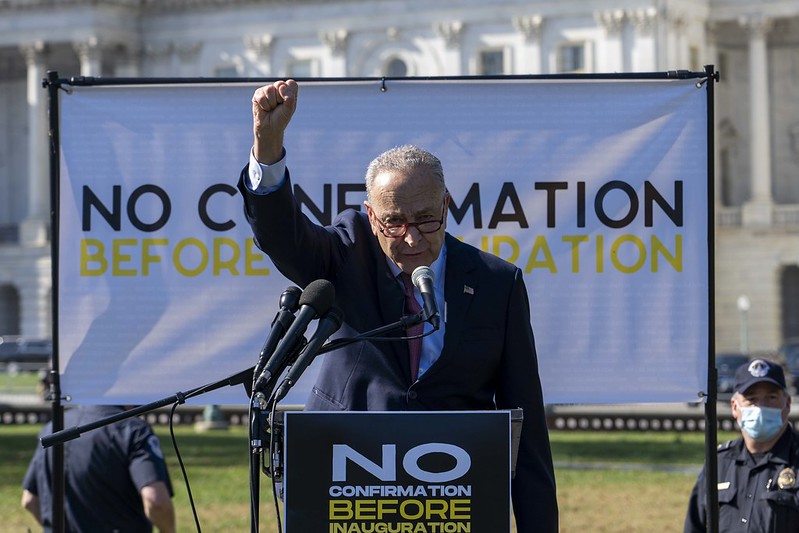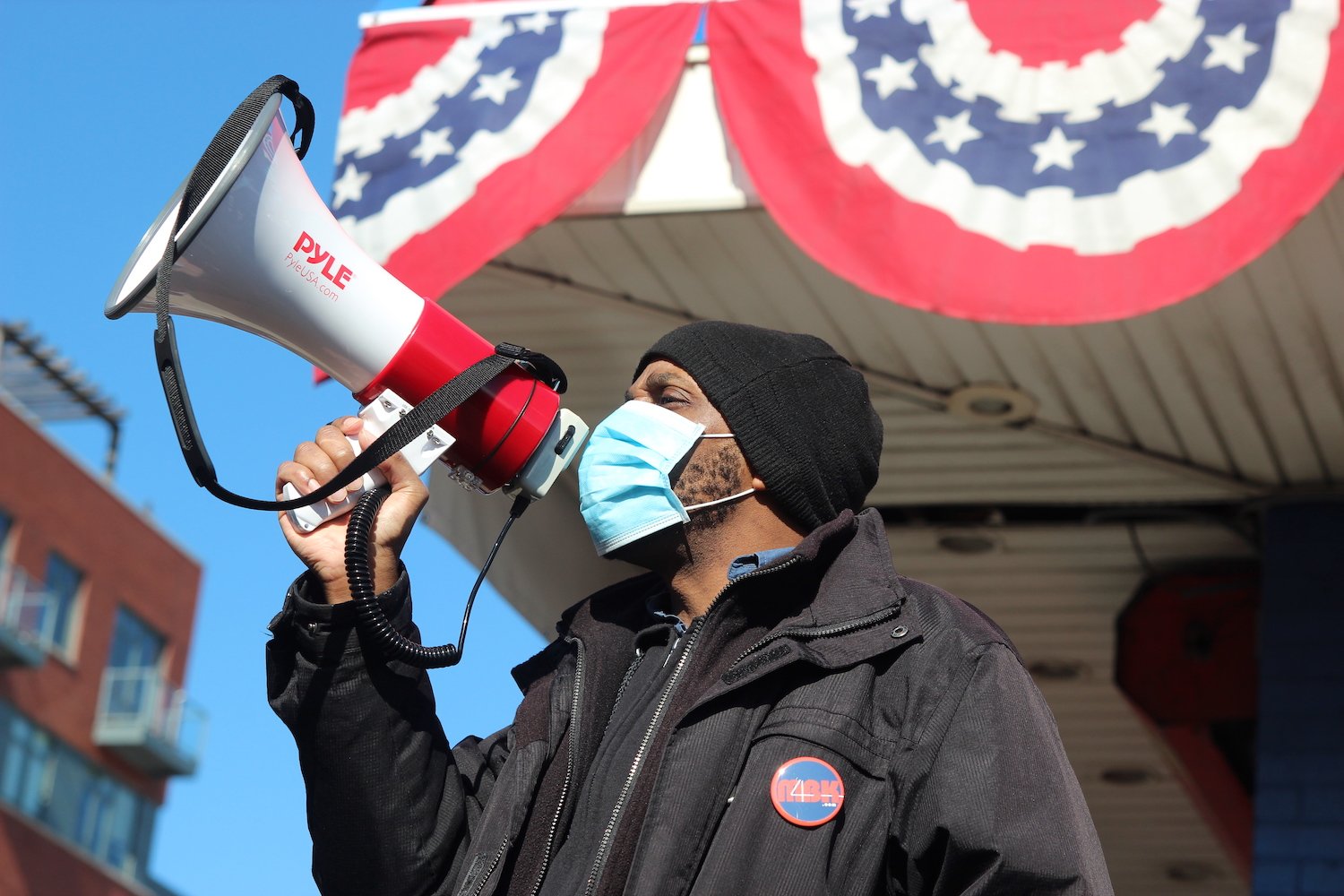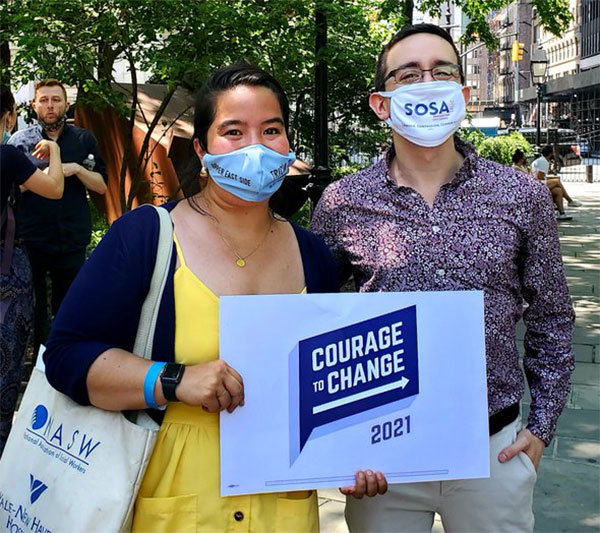To Save Democracy and the Planet, Chuck Schumer Must End the Filibuster

Senate Majority Leader Chuck Schumer (photo: Senate Democrats)
It’s 2024. Democrats have lost the House and Senate thanks to gerrymandering and voter suppression. Although Joe Biden won reelection, Republican Secretaries of State are throwing out millions of ballots in order to change the results. White nationalists storm the capital, and Republican House and Senate leadership welcome them in with open arms. The far right Supreme Court upholds their actions. A Q-Anon believing, white nationalist, climate denier is installed as president. Once again, blue states like New York are denied essential funding from the federal government as vengeance for their voting preferences. City and state level laws that protect immigrants, uphold abortion rights, tackle gun violence, and protect the environment face renewed attacks from an extreme right wing government in D.C. And meanwhile, global carbon emissions continue to rise, locking in an uninhabitable future.
This is the future we face if Majority Leader Chuck Schumer doesn’t end the Senate filibuster to pass S1, the For the People Act, within the next few months.
Donald Trump’s presidency and attempts to steal the 2020 election made clear that our democracy is weak. That’s why Senate Democrats’ very first bill, S1, is a comprehensive democracy reform bill to protect voters, end gerrymandering, and secure democracy.
Meanwhile, state Republicans in swing states of Florida, Georgia, Arizona, Texas, Pennsylvania, and more have passed laws designed to disenfranchise Black, youth, immigrant, and poor voters while making it easier for Republican elected officials to throw out votes after they are cast.
But Schumer is nowhere to be found. With Republicans successfully filibustering legislation to investigate an armed attack on the capitol, you’d be forgiven if you assumed Mitch McConnell was still majority leader. And the clock is ticking on S1: if Democrats don’t pass this crucial democracy reform by the end of the summer, it will be too late to protect voters’ freedom to cast their ballots in 2022. Then, Democrats will likely lose the House and Senate in the midterms, and with that, they will lose their last chance to protect our democracy from the authoritarianism of Trump Republicans.
And the midterm election isn’t our only deadline. According to scientists we have less than nine years left to cut global greenhouse gas emissions and keep global warming to 1.5 degrees. If we continue our current course we will see 3 or even 4 degrees celsius of warming in our lifetimes, enough to displace hundreds of millions if not billions of people, to turn rainforests into deserts, to cause famines, floods and fires leading to horrific mass death on a scale we can’t even imagine. If Democrats don’t act now to protect and secure democracy while also passing aggressive climate legislation, America will miss a precious opportunity to prevent disasters with unimaginable human cost.
Here in New York, millions of people - millions of Senator Schumer’s constituents - could soon see food and water shortages as well as increasingly frequent superstorms and floods. Already, extreme heat kills hundreds of New Yorkers each year, and hits the elderly, the disabled, and Black New Yorkers first and worst.
Senator Schumer has said many times that tackling climate change is a top priority (along with protecting democracy). He has even introduced legislation to electrify transportation and is supporting the THRIVE Agenda, a Green New Deal-inspired legislative package.
But the thing is, none of it matters if he doesn’t end the filibuster. And none of it will matter if Democrats lose the Senate and House in 2022 and the presidency in 2024 to climate denying, white supremacists who are content to let the world burn as long as their oil industry donors make a profit.
Senate Democrats have a brief window to meaningfully protect the American people from an untenable, terrifying future. They must seize it. Senator Schumer is the majority leader. He needs to act like it.
End the filibuster now. Before it’s too late.
***
Liat Olenick is an activist and teacher. On Twitter @LiatRO.
***
Have an op-ed idea or submission for Gotham Gazette? Email This email address is being protected from spambots. You need JavaScript enabled to view it.
Racist Rezonings Made Housing the #1 Issue in Central Brooklyn

Michael Hollingsworth, the author (photo: Hollingsworth campaign)
I live in Crown Heights, and to be specific, on Crown Street. For over 60 years, my building has been home to generations of working-class Black folks just like me. It used to be a rent-stabilized building, but in 2016 my landlord started converting vacant apartments into luxury condos. Some of them sold for over $1 million. Today, he continues to gut renovate empty units while refusing to make repairs to the apartments of existing tenants.
All throughout my neighborhood, I see traces of the Black and brown people who used to call this area home and the businesses that once employed them. On my block alone, what used to be Sea Crest Linen laundromat is now an empty lot targeted for luxury development, and where there was once a warehouse that employed locals, there is now a 12-story condo.
So why has Crown Heights changed so much over the last decade? Some of our elected officials like to cast all of the blame on young white transplants moving into our neighborhood, but gentrification doesn’t happen in a vacuum. It’s the result of decisions made by politicians who put their donors’ interests ahead of our community’s needs and sell us out to private developers. Many of our local elected representatives have spent years passing anti-Black, anti-brown, anti-poor, and anti-working-class housing policy. They’ve gutted tenant protections and neglected the agencies meant to protect us from rising rents and displacement in favor of campaign donations from real estate interests.
That’s not to say we haven’t fought back. My neighbors and I were there in 2017 when District 35’s current City Council member, Laurie Cumbo, approved the sale of our public land, the Bedford Union Armory, for redevelopment. We demanded, alongside Laborers Local 79—a union of construction and general building workers—that the Armory become a community land trust under a new public housing model built with union labor. And we were told that the project would transform the historic site into a recreation center.
But instead, Cumbo and former State Assembly Member Walter Mosley saw it as a money-making opportunity. They created the luxury rental market in Southern Crown Heights where one didn’t exist, and offered so-called affordable units, which were never meant to be accessible to tenants in the area. We were lied to, told that the market-rate units would “subsidize” the recreation center, but in reality, it didn’t need to be subsidized—Cumbo’s developer donors just wanted to make a profit. Compounding past and future harm to the community, construction today at the Bedford Union Armory site is unsafe, underpaid, and non-union.
My neighbors and I were there again in 2018 when Cumbo and her senior staff set their sights on the Franklin Avenue Corridor south of Eastern Parkway, from President to Montgomery Street. Cumbo had plans to rezone the area, bringing in luxury development that would further the cycle of displacement. Opposition from the community was clear, as was the unanimous “no” vote from the community board. But Cumbo and her deep-pocketed real estate allies didn't want to hear what her constituents actually wanted. So this time, we fought back even harder.
Alongside two of my neighbors, I filed a lawsuit against Cumbo, various city agencies, and the developers Cornell Realty Management and Carmel Partners. We represented ourselves in court, while the opposition hired more than 20 attorneys to try and stop the will of the people. In the end, the New York State Supreme Court annulled the 2018 Franklin Avenue rezoning. It was a crucial victory for the long-term Black residents who this development would have displaced.
And where are we now? We’re at a crossroads. So much is at stake in the City Council election happening this month -- with early and absentee voting and primary day, June 22 -- and that’s part of why I decided to run to represent District 35, so my neighbors have the choice to vote for someone who has always stood on the side of our community.
One block away from me, the proposed development at 960 Franklin Avenue is the latest threat to our neighborhood. I remember when it was the Spice Factory, which employed lots of Black and brown folks. Now developers want to rezone to build the largest residential development in Crown Heights history: two massive luxury towers that would loom over the Brooklyn Botanic Garden and the Jackie Robinson Playground—casting shadows that would harm our treasured green spaces and transform our neighborhood into a playground for the real estate industry that’s wholly unaffordable to long-term residents.
Once again, we’re suing the city and the luxury developers whose interests are prioritized over ours. We’ve secured a temporary restraining order to halt construction for now, but the fight isn’t over. It’s a signal of just how broken the system is when we have to sue our own elected local representatives in court to have our voices heard.
Housing injustice is the most important issue facing Central Brooklyn. We need and deserve safe, resilient, deeply and permanently affordable housing for all. To get us out of this crisis, we have to keep fighting alongside our neighbors, building tenant power, and strengthening protections for tenants and homeowners—which I’ve done both locally and statewide as an organizer with the Crown Heights Tenant Union. We also need allies in the City Council who will use their power to strengthen and expand social housing, and have a proven history of standing up to the real estate industry and predatory landlords. Together we can ensure a just future for our city dictated by tenants, working-class homeowners, and workers, not luxury developers.
***
Michael Hollingsworth is tenant organizer, lifelong Brooklynite, and Democratic candidate for City Council in District 35. On Twitter @mike4brooklyn.
***
Have an op-ed idea or submission for Gotham Gazette? Email This email address is being protected from spambots. You need JavaScript enabled to view it.
Why I Chose Kindness as a Candidate — And How Ranked-Choice Voting Made It Possible

Chris Sosa, right, is the author (photo: @ChrisSosa)
The 2021 citywide primary is the first test of ranked-choice voting (RCV), a system I’ve long supported. I fought to ensure RCV wasn’t delayed for this year’s election. Under RCV, negative campaigning has been de-emphasized as candidates compete to become the second or third choice of their opponents’ voters. RCV increases the amount of democracy in our elections and prevents extreme or widely-disliked candidates from being elected with a small plurality in a crowded primary. It encourages candidates to talk to every voter.
Early on in this race, I decided that as a candidate my approach would be different from the style in which I was trained to speak as a long-time political commentator. I had the space to make this change under the RCV system without compromising my competitiveness. The Trump era made our national discourse markedly crueler and angrier, the inevitable end of a social media dystopia. I don’t want to be a force for tearing my community apart further. I decided I’d consciously adjust my conduct to help promote healing of our divisions. I speak from experience as a staffer in the New York State Legislature when I say diplomacy and trust are essential to passing legislation.
I was humbled when my opponents recently singled out my campaign for its kindness when a PoliticsNY debate moderator asked us if we could say something positive about our opponents. It was easy to offer positive words about every person on my screen, because I’ve had the honor of learning more about each of them away from the cameras.
I knew when I entered the race that I was up against a series of machines. This is not an insult to the candidates who benefit, just a fact of New York politics. To put it bluntly, my campaign was a total longshot. From the earliest days, I was up against some well-liked, hardworking candidates who were going to have club and local elected support locked down. But I genuinely believe there’s room for an outsider voice like mine with policy solutions that aren’t always synonymous with the views of the Democratic Party at-large.
I have the right experience as a New York State Senate aide in the Democratic caucus who helped get legislation like the New York State DREAM Act across the finish line. I’m a professional speechwriter who knows the importance of strong messaging. I’m a longtime journalist who not only understands policy but political realities. Most importantly, I’m authentic. I garnered a reputation in the Senate halls for being an unusually transparent aide who could be trusted, because I always spoke my mind. I didn’t only treat my friends with honesty, but also my opponents.
So I decided to do something unusual, perhaps unprecedented, as a Council candidate. I actively befriended every opponent willing to engage with me in good faith. We’ve built genuine relationships over the course of this campaign. Coffees, phone calls, and fostering camaraderie between our teams. I see no value in villainizing people whose work I respect or creating tension between teams largely staffed by hard-working young people trying to do some good in the world. I’ve learned from my opponents. I hope they’ve learned from me. And I expect us to continue working together long after this race concludes.
I reject my opponent and former de Blasio-appointed Census Director Julie Menin’s campaign claim that no one else is experienced enough to bring us back from the pandemic crisis. I respect Julie’s hard work and have enjoyed my own conversations with her to a degree that would probably surprise both of our supporters. But I hope ranked-choice voting will make zero-sum arguments like these less prevalent in future elections. Voters deserve to know that each of us brings a style, vision, and proven skill-set worthy of consideration by our voters.
None of us will win on the first ballot round. This is just the truth of electoral math. Voters have too many qualified choices for any of us to pass 50% outright. In a new dynamic for New York politics, we need each other to win. This is a microcosm of the actual coalition building skills required to be a successful legislator.
The District 5 City Council race is setting a positive example to the entire city of how ranked-choice voting can change and heal our politics. No matter the outcome, New York wins.
***
Chris Sosa is a Democratic candidate for City Council in Manhattan’s 5th District. On Twitter @ChrisSosa.
***
Have an op-ed idea or submission for Gotham Gazette? Email This email address is being protected from spambots. You need JavaScript enabled to view it.




